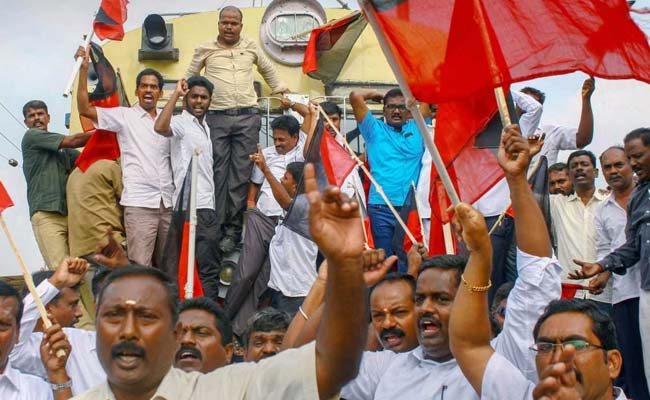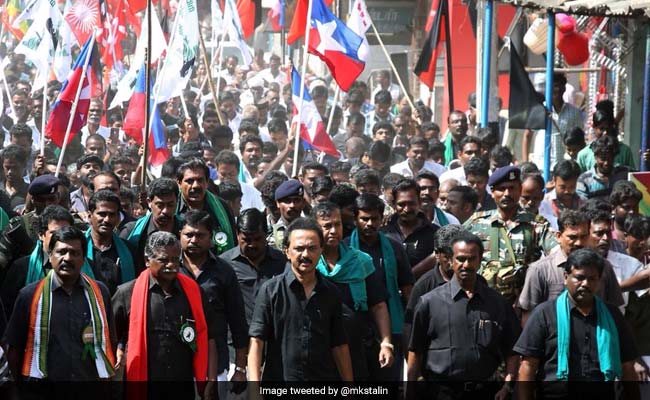The vitriol wasn't entirely personal. Protesters in Chennai -- capital of the prosperous state of Tamil Nadu -- had singled out Modi as the most high-profile representative of a New Delhi establishment that many Tamils have begun to see as biased against them.
Marchers were angry about a very local issue -- the federal government's reluctance to implement a recent Supreme Court order dealing with water-sharing between Tamil Nadu and the neighboring state of Karnataka. But disenchantment in India's south isn't limited to a single issue or, indeed, a single state. The BJP is on the defensive in Karnataka as well, where the incumbent chief minister has sought to turn coming elections into a referendum on sub-national pride.

Protests have been happening over the delay in Cauvery board ever since its deadline expired on March 29. (File)
Recently, however, that uneasy, decades-old accord has broken down. Formerly, the long-ruling Congress party linked the two regions together by drawing voters from both. Modi's BJP has since replaced the Congress as the dominant force in Indian politics, but very much remains much a party of the north and the west, with little or no presence in states like Tamil Nadu.

Protesters carried black flags and black balloons in Chennai ahead of PM Narendra Modi's visit. (File)
Meanwhile, India's interior has human development indicators equivalent to sub-Saharan Africa, while the southern states' human development indices resemble those of upper-middle-income countries. In particular, women are more empowered in many coastal states. Consequently, they have fewer children. Female fertility in many southern states is below the replacement rate; up north, women might have three or four children on average.
Southerners have put these facts together and come to the uncomfortable conclusion that they could wind up becoming a permanent minority politically. Populations in areas that support the BJP will continue to grow in size, while those where the party has no followers are shrinking.
Part of the decades-old compact between south and north was the tacit agreement to ignore demographic changes. India takes a census every 10 years, but for all major distributional issues, including the division of taxes between federal and state governments, it was the population shares of the 1971 census that mattered.
Now the federal government has decided to abandon that decades-old compromise when it comes to tax-sharing. A non-partisan finance commission, appointed every five years, calculates the formula that decides which state gets how much money in India. While the commission itself isn't directly answerable to the federal government, the latter does have the right to set the guidelines the commission must follow -- terms of reference, they're called. This year, the government told the commission to use the 2011 census instead of the 1971 one. Southern states worry that that will significantly reduce the share of revenue received by the very states that have worked hardest to empower women and control their populations and which are, not coincidentally, considerably richer.
In previous decades, this would have been quietly sorted out within the political establishment. But, today, neither the BJP -- representing the hinterland -- nor the regional parties that dominate the coasts have any interest in seeking a compromise. India's two halves have strongly disparate interests, demands and expectations. Healing those growing divisions will be the constant task of future leaders.
(Sharma is a Bloomberg View columnist. He was a columnist for the Indian Express and the Business Standard, and he is the author of "Restart: The Last Chance for the Indian Economy.")
Disclaimer: The opinions expressed within this article are the personal opinions of the author. The facts and opinions appearing in the article do not reflect the views of NDTV and NDTV does not assume any responsibility or liability for the same.
(This story has not been edited by NDTV staff and is auto-generated from a syndicated feed.)


